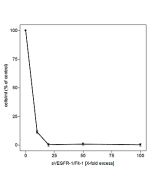Cookie Policy: This site uses cookies to improve your experience. You can find out more about our use of cookies in our Privacy Policy. By continuing to browse this site you agree to our use of cookies.
AdipoGen Life Sciences
VEGF-C (human) (rec.) (His)
As low as
470
CHF
CHF 470.00
In stock
Only %1 left
AG-40T-0046-C02020 µgCHF 470.00

| Product Details | |
|---|---|
| Synonyms | Vascular Endothelial Growth Factor C; VRP; Flt4-L |
| Product Type | Protein |
| Properties | |
| Source/Host | Sf9 cells |
| Sequence | Human VEGF-C (115aa) is fused at the C-terminus to a His-tag. |
| Crossreactivity | Human |
| MW | ~18-24kDa |
| Purity | ≥90% (SDS-PAGE) |
| Reconstitution | Soluble in water and most aqueous buffers. Reconstitute in PBS or medium to a concentration not lower than 50μg/ml. |
| Formulation | Lyophilized. |
| Other Product Data | UniProt link P49767: VEGF-C (human) |
| Shipping and Handling | |
| Shipping | BLUE ICE |
| Short Term Storage | +4°C |
| Long Term Storage | -20°C |
| Handling Advice |
After reconstitution, prepare aliquots and store at -20°C. Avoid freeze/thaw cycles. Centrifuge lyophilized vial before opening and reconstitution. |
| Use/Stability | Stable for at least 6 months after receipt when stored at -20°C. |
| Documents | |
| MSDS |
 Download PDF Download PDF |
| Product Specification Sheet | |
| Datasheet |
 Download PDF Download PDF |
Description
VEGF-C forms primarily non-covalently linked dimers. In adults, VEGF-C is highly expressed in heart, placenta, ovary and small intestine. It binds and activates VEGFR-2 (KDR/FLK1) and VEGFR-3 (FLT4) receptors. It is a growth factor active in angiogenesis and endothelial cell growth, stimulating their proliferation and migration and also has effects on the permeability of blood vessels. It is involved in the regulation of the growth and/or differentiation of lymphatic endothelium. It is also a mitogen for vascular endothelial cells.
Product References
- Ephrin-B2 controls VEGF-induced angiogenesis and lymphangiogenesis: Y. Wang, et al.; Nature 465, 483 (2010)
- Evidence for the interaction of fibroblast growth factor-2 with the lymphatic endothelial cell marker LYVE-1: N. Platonova, et al.; Blood 121, 1229 (2013)







